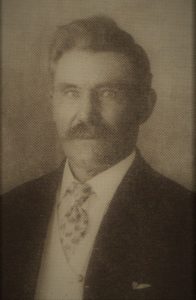
Séra Jón Jónsson Photo: ASÁAB
In the publication “Framhald Á Sextíu Ára Afmælis Bók”, which discusses the history of the Álftavatn (Swan Lake) and Grunnvatn (Shoal Lake) settlements and was published in Winnipeg in 1950, its editor, Skúli Sigfússon, writes about Reverend Jón Jónsson and says: “Reverend Jón Jónsson was one of the pioneer settlers of this settlement, he came from Iceland in 1900 and settled here and started farming with his children. He held masses on Sundays and other holy days; he also worked to ensure that a Lutheran congregation was formed here and it was largely due to his influence that he was the first permanent pastor of this settlement as long as his health permitted. He also started Sunday school, which has continued with good organization. Writing about him as a priest is too much for me, so I am taking up here an article by Reverend Hjört Léo, which was published in Sameiningin and was written after his death in August 1922, and I am putting the article here verbatim: Reverend Jón Jónsson died at the hospital in Winnipeg last March 3. The main details of his life are as follows: Reverend Jón was born on July 15, 1856 in Holt near Reykjavík in Iceland. His parents were Jón Sigfússon Gunnlaugsson Oddsen, cathedral priest in Reykjavík and Sigríður Jónsdóttir from Bólstaðahlið in Húnavatnssýsla. At school, Reverend Jón studied with Helgi E. Helgason, an elementary school teacher in Reykjavík, and entered the learned school in 1874. He graduated from there in 1881. He began studying at the seminary in 1882 and graduated from that school in 1886. In the same year, he married Þorbjörg María Einarsdóttir Guttormsson from Hrafnagerði in Norður Múlasýsla and was ordained to Kvíabekk in Ólafsfjörður in Eyjafjarðarsýsla. He was a priest there for three years. Next he received a call for Hof at Skagaströnd and was a priest there until 1896, then went to the West in 1900 and moved to the Álftavatn (Swan Lake) settlement, where he spent his last days.”
The Priest
“I got to know the late Reverend Jón very well, which was natural, because he had made attempts after he came to the Álftavatn (Swan Lake) settlement to establish a certain Christian activity here, and helped a lot after I came here, although it might seem that it would be a humiliation for himself. I can, when I write about him dead, to show how radical his faith was and his love for the religion for which he had consecrated himself as an advocate. In my opinion, his sermons were good, although the Greeks in the Areopagus would not have liked them. That’s how it always goes, when something new is demanded by Christianity to pass the time. But he had one thing to talk about: Christ and Him crucified, and he didn’t want to preach anything else, even though there was an open path to other teachings. He was a hard worker in his younger years and worked a lot. After he came here and his three children came of age, they were able to take up work as his health declined. He really wanted to get to Iceland, spend his old age there and die there. He loved everything Icelandic, felt that on this side of the sea he was a guest and a stranger; he longed even more for the heavenly fatherland, as also Moses went to Nebo. At the vision of an elder’s soul, when his strength is exhausted, the two appear, the heavenly homeland and the earthly fatherland. And the Lord calls them home for a vision. And dying they pray to him for the earthly fatherland.”
“Reverend Jón was buried in the cemetery of the Lundar congregation on March 9, 1922, in the presence of many people… Reverend Jón Jónsson came to the settlement in 1900 from Hof on Skagaströnd. After that, he did all the priest’s work and said mass in the settlement’s meeting house, and most of the time for little or no pay. He worked to establish a congregation here and implemented it with the help of the church synod, Reverend Runólfur was sent to help him, later the congregation joined the Lutheran church synod.”
